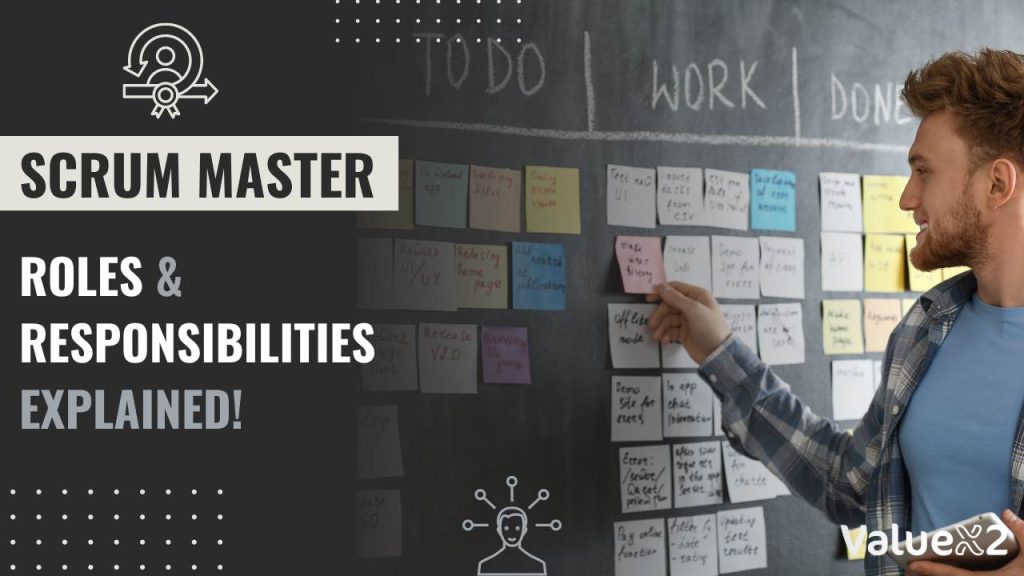Learn the 7 most important Scrum Master roles and responsibilities.
What is Scrum Framework?
The Traditional Waterfall method of product development has several shortcomings and often does not create value for the customer.
Successful companies that build products that are relevant for the customer and help boost revenue leverage an agile approach to product development. There are several agile frameworks that help build products iteratively and incrementally. According to the 2020 Scrum Guide, Scrum is a lightweight Framework that helps people, teams and organizations generate value through adaptive solutions for complex problems.
According to the 17th State of Agile Report, Scrum continues to be the most popular team-level methodology with 63% of Agile users being Scrum Teams.
Scrum Framework utilizes cross-functional Scrum Teams at the heart of it to build, inspect and adapt product delivery. There are two key roles within the Scrum Team: Product Owner and Scrum Master.
As Agile adoption increases and Scrum is becoming a very popular framework, the demand is soaring for the role of a Scrum Master.
Let us deep dive into this article on the Scrum Master Roles and Responsibilities.
What is a Scrum Master?
The role of a Scrum Master within a Scrum Team is to ensure the Scrum Framework is understood, and correctly implemented within the context and enable the team to continuously improve.
A Scrum Master acts as a facilitator and a coach to the Scrum Team on “How” the product is developed, by successfully applying the Scrum theory into practice. It is not the Scrum Master’s Responsibility to Develop the Product itself, that is led by the Product owner and the Agile team itself. But what exactly does a scrum master do? In this blog, we will explore the 7 key scrum master responsibilities. Whether you are a new Scrum Master or want to know more about the role, this blog will give you a comprehensive know-how of what a Scrum Master does.
What are the Scrum Master’s Roles and Responsibilities?
One of the key aspects of the role of a Scrum Master is to be a Servant Leader and a Process Coach for building a high-performing Scrum Team. The other top Scrum Master Roles and Responsibilities are:
- Facilitating Scrum Events
One of the key day-to-day responsibilities of the Scrum Master is the facilitate the Scrum team ceremonies like the daily stand-ups, sprint planning, Sprint Reviews and sprint retrospectives. The Scrum Master has to ensure that these events take place in a way that their intended outcome is achieved productively within the set timebox.
This is one of the vital Scrum Master roles and obligations that can be taught in the Scrum Master Certification training. As a Scrum Master, you must ensure that the crew adheres to the Scrum framework and meets its goals.
- Managing the Product Backlog
The Scrum Master serves the Product Owner in several ways. One of the duties of the Scrum Master is to help find techniques to define the Product Vision and manage the Product backlog. Assist the team in understanding the goal of the Product Backlog and how it should evolve with learning in every sprint. Foster an environment that aids empirical product development including taking feedback from key stakeholders.
This is a vital part of the Scrum Master certification training because it helps to understand the jobs and responsibilities of the Scrum Master. Overall, the Scrum Master performs an important role in assisting the Product Owner by incorporating best practices, and techniques to improve the agile product development process.
- Protecting the Scrum Team
The responsibilities of a Scrum Master encompass coaching the team members in self-management and cross-functionality. This additionally consists of ensuring that the team is free from any distractions or interruptions that can impede their development and that they can work in an environment that is conducive to productivity. The Scrum Master acts as a mediator and facilitator, ensuring that group members can communicate correctly and that conflicts are resolved well-timed and effectively. Additionally, the Scrum Master is accountable for ensuring that the group is well-skilled and geared up to perform their roles and responsibilities. This includes supplying Scrum Master certification schooling to crew contributors and ensuring they understand the Scrum framework and the Scrum Master roles and obligations. Overall, the function of protecting the group is an essential part of the Scrum Master’s position in ensuring the project’s achievement and the stakeholders’ pleasure.
- Removing Impediments
The Scrum Master has to overcome any obstacles or limitations that can preclude the agile teams’ development and overall achieve the product vision. This is an essential factor in the Scrum Master’s roles and duties, as it guarantees that the group can work efficiently and effectively. As a scrum master, it’s key that the team is protected from unnecessary distractions and interference from Business Stakeholders by demanding new scope items to be delivered or not contributing to the delivery of the product vision. Team members focus on sprint tasks by proactively identifying distractions. The Scrum Master removes roadblocks – whether within the team, with other teams, or at the organizational level. For example, they’ll address issues like unnecessary meetings or conflicting priorities that slow down team progress.
Scrum Master certification training focuses heavily on this role, as it’s a significant part of being a successful Scrum Master. As part of your Scrum Master obligations, you will need sturdy problem-solving skills and the potential to work with various stakeholders to resolve any potential limitations. With the proper Scrum Master certification training, you will equipped with the required skills required to excel in the role and be a practical Scrum Master.
- Facilitate the Scrum Process and Framework
One of the roles of the Scrum Master is to ensure that the group follows the Scrum system and adheres to the Scrum values and concepts. This includes overseeing scrum ceremonies along with Sprint Planning, Daily Scrum, Sprint Review, and Sprint Retrospective to ensure they may be achieved efficiently and effectively. The Scrum Master also acts as a trainer and mentor to the group, imparting advice and education on Scrum’s best practices. The Scrum Master certification schooling presents a radical understanding of the jobs and obligations of a Scrum Master, which incorporates “ensuring scrum adherence” as one of the critical areas. As a Scrum Master, it’s their obligation to ensure that the crew follows the Scrum system efficiently and constantly improves it.
- Coaching Team Members
Scrum Masters’s role in agile is of a servant leader for their teams. They also act as Agile Coaches who act as champions of the Scrum Framework. They offer guidance and constant coaching to the team to help them become self-organized and cross-functional, an important Scrum Master responsibility.
A Scrum Master’s responsibilities consist of facilitating the Scrum Framework and ensuring that Team members are prepared with the essential competencies and knowledge to carry out their roles successfully.
- Promoting Scrum Values and Principles
Promoting the values and principles of Scrum is one of the critical roles and responsibilities of the Scrum Master. The Scrum Master is responsible for Leading, coaching and training the Team and Organization to the values and ideas of Scrum as mentioned in the Scrum Framework. These values include commitment, focus, openness, respect, and courage. The Scrum Master Role supports the organization in planning and consulting Scrum implementations. One of the duties of the Scrum Master is to help the organization understand and adopt an empirical (PDCA – Plan Do Check Adapt) cycle for product development. The Scrum Master also helps facilitate interactions between various stakeholders and Scrum Teams to enhance transparency and alignment.
Conclusion
The Role of a Scrum Master is pivotal for building a high-performing Scrum team and successfully executing the Scrum Framework for agile product development. We have highlighted the top 7 Scrum Master Roles and Responsibilities in this article however it is essential to excel in this role that one seeks to pursue a reputed Scrum Master Certification. Within this training, you will learn tools and techniques to become a successful Scrum Master in Agile. To summarise the top Scrum Master Responsibilities are: :
- Facilitating Scrum Ceremonies
- Managing the product backlog
- Protecting the Scrum Team
- Remove impediments
- Facilitate the Scrum Process
- Coaching the cross-functional Scrum Team
- Promoting Scrum values and principles
By fulfilling those roles, the Scrum Master facilitates the creation of a culture of transparency, collaboration, and relentless improvement in the team.
What is the Scrum Master’s role on a daily basis?
Although context influences a lot the agile implementation at any company, below is a typical breakdown of the daily activities of Scrum Master:
- Facilitating the Daily Stand-up
- Assisting in the removal of any impediments
- Coaching and guiding the team
- Helping the team become high-performing and self-organized
- Assisting in Sprint Planning Preparation
- Retrospective Facilitation
- Aiding a culture of constant learning and knowledge sharing
This is not an exhaustive list of roles and responsibilities a Scrum Master has to perform on a daily basis however can be used as a starting point. Agility is the key so with changing demands a Scrum Master must be adaptable and responsive.
What is the average typical Scrum Master Salary?
There are several factors that influence the Salary that a Scrum Master earns. A few to mention are:
- Years of experience
- Seniority of the role
- Maturity of the agile implementation in the company
- Sector/industry of the company
- Location of the job
- Certifications that the candidate holds
- Additional skills of the candidate
The average salary of Scrum Master in the UK ranges from:
Glassdoor: £47,728 per year
Indeed: £55,000 per year
Reed: £60,000 – £90,000 per year (for permanent, full-time positions) (https://www.reed.co.uk/average-salary/average-scrum-salary)
National Average Salary Ranges in the US for a Scrum Master:
Glassdoor: $108,026 per year
Indeed: $106,965 per year
ZipRecruiter: $112,999 per year
Salary.com: $106,198 per year
Remember, these averages are influenced by a number of factors as discussed above.
What qualifications do you need to become a Scrum Master?
As agile adoption and popularity are increasing so is the demand for skilful and certified Scrum Masters. Often we get queries on what is a Scrum Master certification. Having the right Scrum Master certification will help you further your career, demand significantly higher salaries and have better Scrum Master job opportunities. A few of the globally recognized Scrum Master Certifications recommended by recruiters, HR, hiring managers and employers are:
- Professional Scrum Master™ (PSM) Certification: To become a certified Professional Scrum Master, enrol for the PSM training led by a PST (Professional Scrum Trainers). This certification is provided by Scrum.org. It helps master the Scrum framework and learn how to practically apply Scrum in real-world scenarios.
- SAFe® Scrum Master (SSM): Enrolling and completing this SAFe certification helps understand the role and responsibilities of a Scrum Master within the Scaled Agile Framework. As per SAFe Careers Snapshot 2024 report 67% of the available job postings in the US required SAFe Scrum Master certification.
How to get a Scrum Master Job?
The Scrum Master Role is a rewarding job both financially and in terms of job satisfaction. A few of the tips and steps to get a Scrum Master job are:
- Walk the Scrum talk: Embody Agile Mindset, values and principles as you will need to coach teams which requires leading by example.
- Obtain the right Scrum Certification: Typically, most Scrum master job descriptions require applicants to have at least one of the Scrum certifications like Professional Scrum Master (PSM) or SAFe Scrum Master certification (SSM).
- Examples to showcase the right skills: You will also need to demonstrate competence in working with people, teams, and stakeholders on time-sensitive initiatives. Highlight how your leadership, communication, problem-solving, and facilitation skills align with those a great Scrum Master requires.
- Review Job boards, networking events and connecting with recruiters should help get a Scrum Master job ( such as Jooble)
How to get a Scrum Master Certification?
Selecting the right Scrum Master Certification will showcase to prospective employers that you have the right foundation and skills required to become a successful Scrum Master.
To become a certified Professional Scrum Master (PSM) by Scrum.org enrol for a class conducted by PST and take the PSM™ I exam to achieve Professional Scrum Master™ I (PSM™ I) certification.
To become certified SAFe Scrum Master (SSM) enrol for live two-day SSM training and pass the SAFe Scrum Master examination to get the SAFe 6 Scrum Master certificate.

Bhavna is an Agile Coach and Consultant with over a decade of experience in advisory, corporate finance, IT assurance, and operations at Big 4 and within the industry in the UK and India. She has recently been the CEO of a start-up where she implemented agile practices within HR, Marketing, and Product teams.
She is also a SAFe® Practice Consultant (SPC) and authorized instructor for ICAgile Agility in HR (ICP-AHR), Agility in Marketing (ICP-MKG), and Business Agility Foundations (ICP – BAF) training courses. She provides training for agile transformation to corporate, public, and private batches, as well as consulting for enterprise agile transformation.







